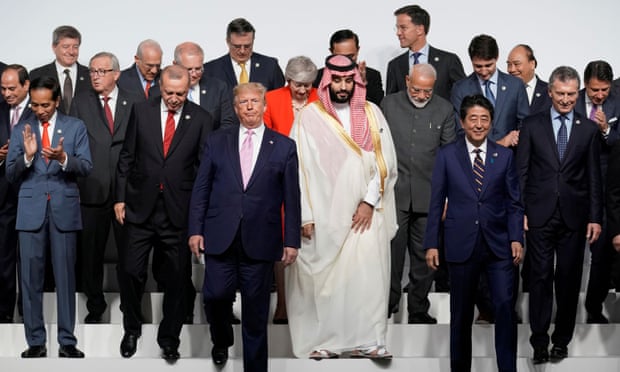Article

Leaders from 2008 crisis call for G20 emergency summit on coronavirus
Veterans of the global response to the 2008 financial crisis have called for an emergency summit of G20 countries to discuss the threat to the world’s economy from the coronavirus and the Saudi Arabia-Russia oil price war.
Governments have been taking their own steps such as interest rate cuts and measures to free up credit, but figures including Kevin Rudd and José Luis Zapatero, former prime ministers of Australia and Spain respectively, think collective action may be needed.
Tom Fletcher, the senior British civil servant at the 2009 G20 summit in London, which was credited with breaking the back of the financial crisis, said a special G20 was “the least bad option we have”.
“With hindsight this [2009] was the high watermark of 21st-century global cooperation,” he said. “But even so, I recall Barack Obama and Gordon Brown saying privately at the end that the next crisis would be much worse unless the architecture for global cooperation were improved. The last decade has evidently failed to do that.”
Fletcher said the proposal required a host to come forward and a group of countries to back it, including Japan, last year’s G20 summit host.
The next scheduled meeting of the G20, which comprises 19 countries and the European Union, is not due until November. The host will be Saudi Arabia, one of the countries that has triggered the oil crisis. The G7 is scheduled to meet in June at Camp David in the US.
The Dow Jones Index had its worst day in 12 years on Monday, and most forecasts have the world economy growing by as little as 1% this year. Those calling for a special summit – even held in the form of a teleconference – say the geopolitical ramifications of the past month have yet to be absorbed, let alone collectively tackled.
Rudd, who was Australia’s prime minister during the financial crisis, has led the calls for a summit, saying the world needs to act on “underlying market uncertainty”. He said the G20 should address the global public policy response to the virus itself and the ability of central monetary authorities to deal with the cashflow crises hitting corporations and small businesses.
Rudd said the 2009 summit was the single event that broke the financial crisis. “At present the markets currently only see every man for himself,” he said.
Other figures calling for action at G20 level include Nicholas Burns, a senior diplomat under Bill Clinton, Taro Aso, Japan’s deputy prime minister, and Zapatero. The idea has the support of international trade unions, which are formal partners at G20 gatherings.
However,no serving leader has yet come forward to play a convening role. Probably the closest is Christine Lagarde, the head of the European Central Bank, who has warned of a 2008-style crash unless Europe acts together.
Fletcher acknowledged that it would be hard to convince Donald Trump “not just to sit in the room with all these people who despise and despair of him (and vice-versa) in an election year, but also to agree coordinated measures”.
“We were in 2008 in a much better phase of the internationalist/nationalist geopolitical cycle,” Fletcher said. “Pound for pound, there was more leadership around the table than today. Kevin Rudd, a stronger Merkel. Most understood that they were toast without results.”
Under pressure from his advisers and the polls, Trump appears to be rowing back from his initial attempt to downplay the impact of the coronavirus. He is now even discussing a temporary elimination of payroll taxes, which could cost $700bn – a move that would rival both the financial bailout of 2008 and the economic stimulus measures that followed.
It is also argued that Trump needs a forum to cool the oil price war between Mohammed bin Salman, the 34-year-old Saudi crown prince, and the Russian president, Vladimir Putin. The crown prince launched his destabilising war at the precise moment when oil demand was contracting partly due to coronavirus. A side-effect intended by Putin will be to crater an already indebted US shale gas industry. Many shale operators in US swing states are not viable when the oil price falls below $50 a barrel.
Normally summits take months to prepare, and one with such a large agenda might need longer. A failed summit now in which Trump goes in search of culprits could be worse than no summit at all. In the current “cancel everything” mood, the idea of bringing world leaders and their respective entourages together could be counter-productive.
It would also hardly fit with the message of social distancing. An e-summit or tele-summit like the one conducted by the EU heads of government on Tuesday might work as a compromise.
Photo description / credit: The last G20 leaders’ summit took place in Japan in June last year. The next one is due to be in Saudi Arabia in November. Photograph: Kevin Lamarque/Reuters.

